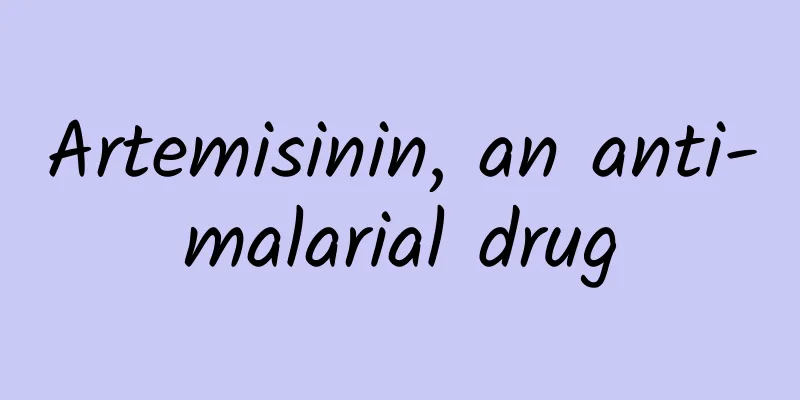Artemisinin, an anti-malarial drug

|
Since ancient times, humans have been waging a long struggle against malaria, which was recorded in the Yellow Emperor's Classic of Internal Medicine - Suwen as early as BC. Until now, malaria is still rampant in many countries in the world, threatening people's health and lives. On October 5, 2015, the Karolinska Institute in Sweden announced that the 2015 Nobel Prize in Physiology or Medicine would be awarded to Chinese pharmacist Tu Youyou and two other overseas scientists in recognition of their contributions to the research on the treatment of parasitic diseases such as malaria. Tu Youyou also became the first Chinese scientist to receive this award. Before the discovery of artemisinin, quinine and chloroquine were the main antimalarial drugs used. However, the success of drugs such as quinine and chloroquine in treating malaria did not last long. In the 1960s, drug-resistant malarial parasites began to appear in many areas, especially in Southeast Asia and Africa, and there were even no effective drugs available. Since then, the development of new antimalarial drugs has become crucial[1]. In 1972, Tu Youyou and her research team screened more than 2,000 Chinese herbal medicine prescriptions and found that the extract of Artemisia annua from the Asteraceae plant had a certain inhibitory effect on mouse malarial parasites, but it was speculated that the concentration of the active ingredient was too low due to improper extraction methods. Later, inspired by Ge Hong, a medical scientist in the Eastern Jin Dynasty of my country, they switched to low-temperature ether extraction method and successfully extracted artemisinin, the active ingredient for treating malaria. The inhibitory rate of this extract on malarial parasites reached 100%[2]. Artemisia annua, also known as stinking wormwood and bitter wormwood, is an annual herbaceous plant belonging to the Asteraceae family and is common in both northern and southern China. As early as the 2nd century BC, the Chinese pre-Qin medical prescription book "Fifty-two Prescriptions for Diseases" had already recorded the plant Artemisia annua. In 340 AD, Ge Hong of the Eastern Jin Dynasty first described the antimalarial function of Artemisia annua in his book "Emergency Prescriptions for Treating Cold, Heat and Malaria". In the second half of 1971, Tu Youyou was inspired by the record in "Emergency Prescriptions for Treating Cold, Heat and Malaria" that "take a handful of Artemisia annua, soak it in two liters of water, squeeze out the juice, and drink it all". She believed that high temperature might affect the effective ingredients of Artemisia annua and affect the efficacy, so she changed the extraction method from ethanol to ether, which has a lower boiling point than ethanol[3]. Compared with other antimalarial drugs, artemisinin-based drugs have the effect of efficiently and quickly eliminating malarial parasites. However, due to their short half-life in the body, in order to completely eliminate malarial parasites while slowing down the development of resistance, researchers recommend the use of artemisinin and its derivatives in combination with other antimalarial drugs. In 2004, the Lancet magazine reported that the cure rate of falciparum Plasmodium falciparum treated with artesunate in combination with other drugs reached over 80%, and the relapse rate and gametocyte infection rate were also significantly reduced [4]. As of 2013, 79 of the 87 countries in the world where falciparum malaria is endemic have adopted artemisinin-based combination therapy as the first-line drug for the treatment of falciparum malaria. Artemisinin has created a new generation of antimalarial drugs. It comes from traditional Chinese medicine. Its discovery has saved the lives of millions of people around the world, especially in developing countries. I believe that with the continuous efforts of scientific researchers and medical staff, global malaria will be controlled and even eliminated. References [1] Wu Yulin. Artemisinin: a wonder of Chinese herbal medicine, the antidote to malaria. University Chemistry, 2010, 25: 7 [2] Zhang Jianfang. Late report: A record of the 523 project and the development of artemisinin. Late report: A record of the 523 project and the development of artemisinin, 2015 [3] Hou Guinan. Tu Youyou: The discovery of artemisinin is a gift from traditional Chinese medicine to mankind. University Science Popularization, 2011, 5: 1 [4] Huang Fang, Zhou Xiaonong. The status and role of artemisinin in global malaria control. Science Bulletin, 2016, 3 |
<<: Stick to your dreams and strive for excellence - Proposal to women scientists nationwide
>>: Low blood pressure is common among women. Does it have any impact on health? What should we do?
Recommend
Marketing promotion methods | How to create private domain traffic?
Friends from different industries asked them how ...
How to promote user sharing and dissemination?
For internet dogs, it is easy to organize an even...
How to play Baidu bidding ocpc second level
For SEMers who often play with small Baidu accoun...
Five core points: How to carry out refined operations of mobile games
[[129440]] Mobile game operation can be understoo...
You may not have thought of it: five ways to reduce the cost of acquiring users!
In the mobile gaming industry, user acquisition is...
SmartGO, a new brand of Huidian Technology, is launched to promote mobile informatization of government and enterprises
On July 6, the "Taiji Stock Mobile Strategy ...
How to promote APP? APP promotion tips!
Mobile devices have become the most important too...
Official account: Niantian Jue Xue Niantian Jue Ji (Part 3) Fault series video
Official account: Nian Tian Jue Xue Nian Tian Jue...
This mushroom that grows on poop, you often use it to make soup!!!
Mushrooms grow on poop Pickled pepper chicken fee...
Android WeChat 7.0.18 released: taps can be withdrawn, and comments in Moments can be deleted
WeChat has just released the latest official vers...
Video of an African kid sending birthday wishes
Recently a group of children who made creative bi...
ShowGirls' stories: Things you don't know
ShowGirls have always been a beautiful sight at e...
Headline money-making project, easily answer questions and earn pocket money every day
You should look for and see projects that can mak...
With both people and money, will the world's largest e-sports market usher in a better spring?
In 2014, Chinese e-sports players surpassed South...









